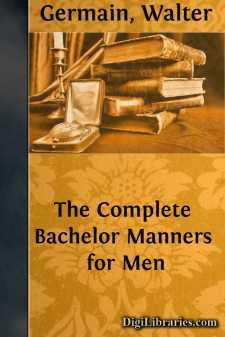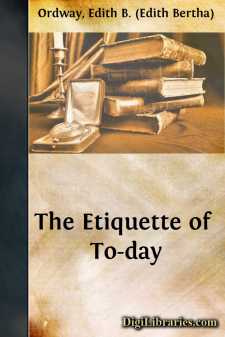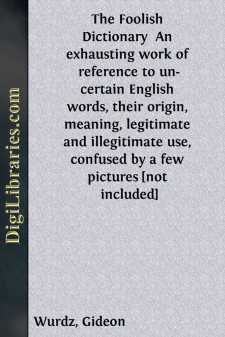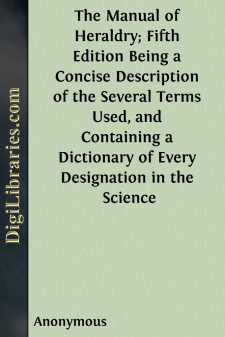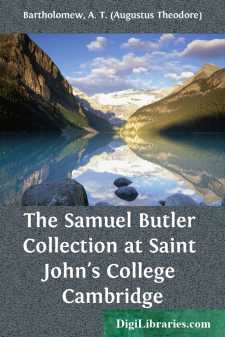Reference
- Atlases 1
- Bibliographies & Indexes 10
- Catalogs 55
- Dictionaries 1
- Encyclopedias 43
- Etiquette 14
- Handbooks & Manuals 19
- Heraldry 2
- Quotations 9
Reference Books
Sort by:
by:
Walter Germain
THE BACHELOR IN PUBLIC. The average man is judged by his appearance and his deportment in public. His dress, his bearing, his conduct toward women and his fellow-men, are telling characteristics. In the street, when walking with a woman—the term "lady" being objectionable, except in case of distinction—every man should be on his mettle. Common sense, which is the basis of all etiquette,...
more...
by:
Daniel Defoe
INTRODUCTION Being to direct this discourse to the tradesmen of this nation, it is needful, in order to make the substance of this work and the subject of it agree together, that I should in a few words explain the terms, and tell the reader who it is we understand by the word tradesman, and how he is to be qualified in order to merit the title of complete. This is necessary, because the said term...
more...
THE REWARDS OF ETIQUETTE Society is a game which all men play. "Etiquette" is the name given the rules of the game. If you play it well, you win. If you play it ill, you lose. The prize is a certain sort of happiness without which no human being is ever quite satisfied. Because the demand for social happiness is thus fundamental in human nature, the game has to be played quite seriously. If...
more...
by:
Gideon Wurdz
It's a long lane that has no ashbarrel. ABSINTHE From two Latin words, ad, and sinistrum, meaning "to the bad." If in doubt, try one. (Old adage, "Absinthe makes the jag last longer)." ABSTINENCE From the Persian ab, water, and stein, or tankard. Hence, water-tankard, or "water wagon." ACCESSION A beheading process by which you may either win or lose a political job. Old...
more...
by:
Charles Boutell
AUTHOR’S PREFACE This Volume, specially prepared for the use of students at an early period of their study of English Heraldry, commends itself also to those inquirers who may desire to obtain some general information on the same subject, without having any intention to devote to Heraldry much either of their time or of their serious regard. The success, no less extraordinary than gratifying, of my...
more...
by:
William Congreve
INTRODUCTION When William Congreve died in 1729 he left a collection of books which his old friend and publisher, Jacob Tonson, described (in a letter preserved at the Bodleian) as “genteel & well chosen.” Tonson thought so well of the collection that he urged his nephew, then his agent in London, to purchase Congreve’s books. But Congreve had willed them to Henrietta, the young Duchess of...
more...
by:
Anonymous
CHAPTER I. ORIGIN OF COATS OF ARMS. Heraldry is the science which teaches how to blazon or describe in proper terms armorial bearings and their accessories. Many volumes have been written on the origin of Heraldry and even on the antiquity of separate charges contained in an escutcheon: it would be filling the pages of an elementary work on Heraldry to little purpose to enter upon an inquiry as to the...
more...
GENERAL ADVICE The United States is divided geographically into military departments with a general officer commanding each department. The departments and their headquarters are as follows: (1) The Northeastern Department, with headquarters at Boston, Massachusetts. (2) The Eastern Department, with headquarters at Governors Island, New York. (3) The Southeastern Department, with Headquarters at...
more...
SELECTED PASSAGES When you have read, you carry away with you a memory of the man himself; it is as though you had touched a loyal hand, looked into brave eyes, and made a noble friend; there is another bond on you thenceforward, binding you to life and to the love of virtue. It is to some more specific memory that youth looks forward in its vigils. Old kings are sometimes disinterred in all the...
more...
I. PICTURES, SKETCHES AND DRAWINGSBY OR RELATING TO SAMUEL BUTLER By his will Butler bequeathed his pictures, sketches, and studies to his executors to be destroyed or otherwise disposed of as they might think best, the proceeds (if any) to fall into residue. They were not sold: some were given to Shrewsbury School; some to the British Museum; one, an unfinished sketch of the back of the house in...
more...


